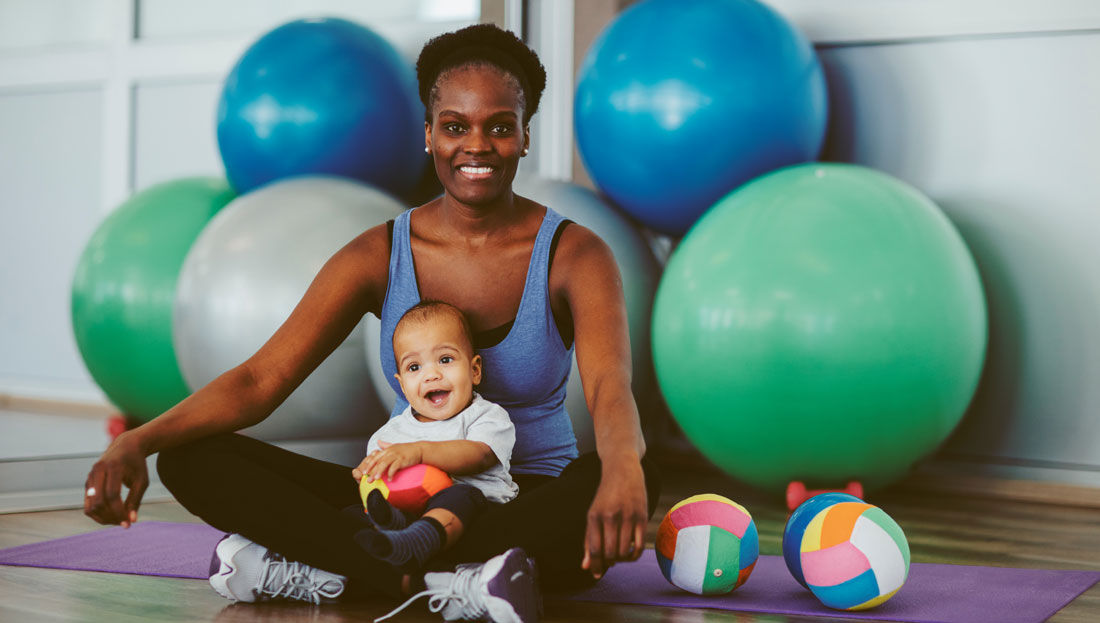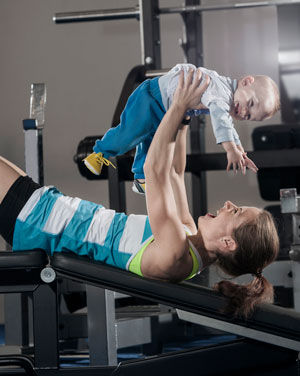
When a woman enters into motherhood, she experiences a life-changing transition. Her world changes drastically, both physically and emotionally. If you are a health and fitness professional serving this population, you can make a significant and positive impact in the lives of these women. You also have an incredible opportunity to create a specialized experience for moms in your community and to build your training business. Read on to learn how…
What Does a Mom Want or Need From a Trainer?
A mom wants a health and fitness professional who “gets her”—who understand that her life, her body and her daily experiences are unique. Taking the time to understand her—physically and emotionally—makes all the difference in the world.
Through pregnancy and into motherhood, a woman’s body will change more than a man’s will in his entire lifetime. From the exaggerated spinal curves as her pregnancy progresses to the physical demands of caring for another human being, her body will experience unique challenges.
Her day-to-day experiences are also likely different than what she has previously known. She probably went from a full-time job to staying home with her newborn (for at least six weeks, maybe longer) and she could feel very isolated. Her time is limited and “mommy guilt” may set in. She likely feels as though her own needs must take a backseat to ensuring the well-being of her child.
Being aware of and understanding these myriad challenges will position you as a trainer who “gets her” and you can then train her with that knowledge and compassion. Mothers—and new mothers in particular—specifically are drawn to, connect to and are loyal to experiences and services that speak to their uniqueness. When a business or service (like your training) addresses her new life and challenges, she will likely stay. Here are some of the ways you can be the trainer she needs:
Be Knowledgeable
Truly understand her physiological changes and needs by being an expert on training the prenatal and postpartum woman. Earn a reputable certification and on-going continuing education so you are armed with the most up-to-date research, guidelines and recommendations. Study the musculoskeletal imbalances that typically occur during nine months of pregnancy. Further, understand the physical challenges she is faced with every day that come from caring for a continuously growing, non-compliant load—her baby.
A woman’s child(ren) throw her body off balance all the time. Training her with that knowledge in mind can help you design effective programs that offer instability challenges with dispersed load. For example, using uneven resistance applied to movement-based exercises (e.g., anchor a resistance band in front of her and have her hold both handles in one hand as he performs a walk or run in place).
Be Flexible
 Be flexible with her physically and logistically. As much as her physical state is continuously changing, so is her day-to-day schedule. From a training standpoint, understand that she may still be recovering (well after she has received her physician’s clearance at six weeks postpartum) and workouts that seem great one day may not work for another. She is also probably dealing with a very erratic sleep schedule (to put it mildly), so she may have fluctuating energy and concentration levels from session to session. Because her day can change at a moment’s notice due to increased fatigue, her child’s nursing/feeding/nap schedule and doctor’s appointments, her training regimen will need to have some fluidity, as well.
Be flexible with her physically and logistically. As much as her physical state is continuously changing, so is her day-to-day schedule. From a training standpoint, understand that she may still be recovering (well after she has received her physician’s clearance at six weeks postpartum) and workouts that seem great one day may not work for another. She is also probably dealing with a very erratic sleep schedule (to put it mildly), so she may have fluctuating energy and concentration levels from session to session. Because her day can change at a moment’s notice due to increased fatigue, her child’s nursing/feeding/nap schedule and doctor’s appointments, her training regimen will need to have some fluidity, as well.
Logistically, find the days and times that work for both of you and then create your back-up plan. “Rolling with it” is key to showing that you understand her world and that you can be accommodating. Be flexible with your training locations, as well. She may occasionally need to train in her home when/if her baby’s nap schedule changes. She may also need to have some of her workouts designed around moving with the stroller. As long as you are flexible, she will feel cared for and understood.
Be Empathetic
Her world has transitioned in so many ways. She will likely be experiencing a plethora of emotions, including guilt for taking any time for herself. She may fell as though her whole existence should be about her baby.
Importantly, she also may feel like she should be doing a better job at this motherhood thing. You may hear her say things like, “I should be at my pre-pregnancy weight or in my pre-pregnancy clothes by now,” or “I should be able to have a clean house and care of my baby, too,” or “I should be able to sneeze/cough/jump/run without peeing a little.” The best advice to give her is to stop “should’ing” on herself! She is doing her best and when she is working on her health and wellness after having a baby, patience and persistence will be your focus together. Show her that you are with her, by her side, and that you believe she can do whatever she sets her mind to—and sometimes that needs to happen in baby steps.
Be Empowering
 Help her to understand the incredible role she has as a mom. When she is feeling positive, healthy, strong and confident, this will undoubtedly have a positive effect on the children she is raising. Take time in each of your trainings sessions to empower her, build her self-esteem and congratulate her for taking the time for herself. Help her understand that while she may feel selfish, she is actually doing some amazing work by being healthy and positive for her children. When she walks through her world with strength and happiness, her children are more likely to do the same.
Help her to understand the incredible role she has as a mom. When she is feeling positive, healthy, strong and confident, this will undoubtedly have a positive effect on the children she is raising. Take time in each of your trainings sessions to empower her, build her self-esteem and congratulate her for taking the time for herself. Help her understand that while she may feel selfish, she is actually doing some amazing work by being healthy and positive for her children. When she walks through her world with strength and happiness, her children are more likely to do the same.
A mom is a unique and wonderful client to train. Focusing on the mom market can profoundly impact your business and the lives of these very important humans. The best way to build your business in the mom market is to treat them like gold. Moms talk. They talk about what they like and don’t like. If she has a wonderful and effective experience with you, she will tell other moms. To obtain, train and retain these wonderful women, be knowledgeable, be flexible, be empathetic and be empowering. Your impact can be transformational and could impact multiple generations.





 by
by 

 Be flexible with her physically and logistically. As much as her physical state is continuously changing, so is her day-to-day schedule. From a training standpoint, understand that she may still be recovering (well after she has received her physician’s clearance at six weeks postpartum) and workouts that seem great one day may not work for another. She is also probably dealing with a very erratic sleep schedule (to put it mildly), so she may have fluctuating energy and concentration levels from session to session. Because her day can change at a moment’s notice due to increased fatigue, her child’s nursing/feeding/nap schedule and doctor’s appointments, her training regimen will need to have some fluidity, as well.
Be flexible with her physically and logistically. As much as her physical state is continuously changing, so is her day-to-day schedule. From a training standpoint, understand that she may still be recovering (well after she has received her physician’s clearance at six weeks postpartum) and workouts that seem great one day may not work for another. She is also probably dealing with a very erratic sleep schedule (to put it mildly), so she may have fluctuating energy and concentration levels from session to session. Because her day can change at a moment’s notice due to increased fatigue, her child’s nursing/feeding/nap schedule and doctor’s appointments, her training regimen will need to have some fluidity, as well.


